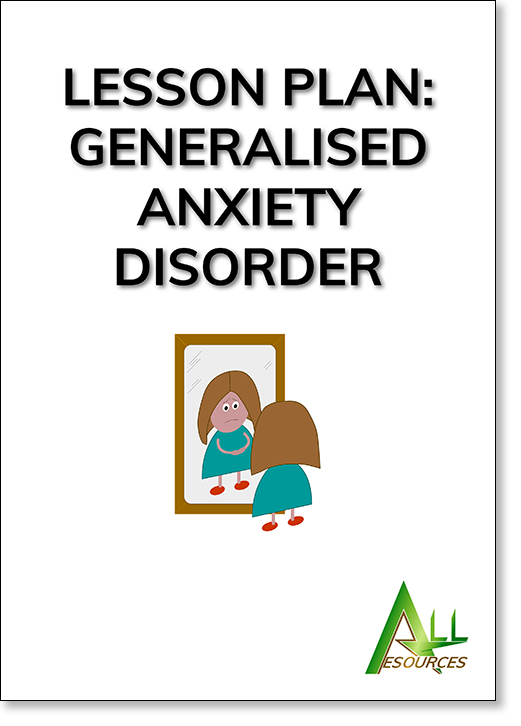Anxiety

Generalised Anxiety Disorder
A lesson plan examining anxiety and generalised anxiety disorder — a more extreme form of anxiety.
- Age range: 12 years and upwards
- Category: Lesson plan
- First published: 2022
- Pages: 14
- Duration: 55 mins – 1 hour
Hard copy: £10.99 add to basket
Anxiety has always been a common problem, particularly in the highly pressurised, technology-driven, interconnected 21st century.
We have seen a marked increase in anxiety following the COVID-19 pandemic and the current cost of living crisis. Anxiety issues range from nervousness and feeling jittery to severe forms of anxiety. A certain level of anxiety is normal, but when it takes over your life you need to seek medical help.
What is Anxiety?
People feel anxious for a variety of reasons, and feeling nervous from time to time is not a cause for concern. Anxiety is an uncomfortable feeling of uneasiness, usually due to a specific worry or fear. Mild anxiety usually subsides as the issue that caused the worry is resolved.
Causes of Anxiety
We may suffer with anxiety for a variety of reasons, for example when we are facing a particularly difficult time. Some of the most common causes of anxiety include the following:
- An important appointment or meeting is due
- When taking an exam or test
- Experiences from your past
- Certain prescription drugs and medication
- Alcohol and drugs
- Stress
Symptoms of Anxiety
The are a range of symptoms that indicate an anxiety disorder as follows:
- Irritability and shortness of temper
- Restlessness and agitation
- Inability to concentrate
- Feeling nervous and edgy
- Extreme tiredness
- Difficulty sleeping
- Unexplained pains including headache and stomach ache
- Panic attacks
Severe Anxiety (GAD)
Severe anxiety is more extreme than general anxiety. People who suffer with extreme forms of anxiety are often diagnosed with generalised anxiety disorder (GAD). GAD can leave sufferers feeling dizzy, tired and exhausted and the anxiety attacks often require some form of anxiety treatment.
How to Deal with Anxiety
Anxiety treatment can take the form of anxiety medication as well as self-help measures such as meditation and CBT. Your GP may recommend CBT (cognitive behavioural therapy) or they may prescribe medication to control the feelings of anxiousness. Some stress-management strategies can also help alleviate anxiety.
Social Anxiety Disorder
Social anxiety disorder is a condition which causes extreme self-consciousness and worry. Sufferers are concerned about every detail of their appearance, personality and how they come across to other people. They believe that others are critical of them and are judging them. They are usually so consumed with worry and fear that they avoid social situations entirely.
Mental Health Awareness Week
The theme for this year’s Mental Health Awareness Week is: ‘Anxiety’. The focus is on raising awareness of anxiety and looking at different ways to prevent it.


